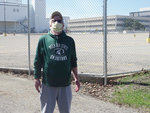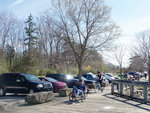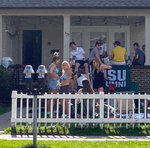





If you want to distance yourself from other people in the heart of Lansing, there’s no better place than the weedy parking lot of General Motors’ former Oldsmobile headquarters.
On a sunny Friday afternoon, with acres of asphalt at his back and nobody around, Bill Stephenson, 65, felt safe enough to pull up his cloth mask and take a pull on a cigarette. A bag of sanitary wipes was packed in the pouch of his sweatshirt.
He glanced guiltily at the cigarette. “I know I shouldn’t be doing this,” he admitted.
On the first warm Friday in early spring, people all over Lansing emerged from lockdown by the hundreds. They did smart things and stupid things. Many kept their distance from each other and wore masks. And many did not.
Friday afternoon, City Pulse sent a team of reporters around town to take a snapshot of an unprecedented social and epidemiological experiment following from Gov. Gretchen Whitmer’s executive orders that require masks under some circumstances and encourage in others.
What we saw was a chaotic mix of carefulness and carelessness.
“Too many people are taking this easy,” Stephenson said. “It’s scary to me. I don’t take it as a joke at all. It’s very serious. We’re in a lot of trouble right now, especially if you’re older.”
As if deadly contagion weren’t enough, the seeds of a new cultural divide are starting to sprout. Scenes like the following are breaking out on an untold scale: At the Apple Market on Oakland Avenue, a 20-something man rushed out of the store with a small purchase in a paper bag. Without noticing, he brushed past a 60-something man in a mask who was trundling slowly in the opposite direction.
The older man took half a step backward, stopped in his tracks and swiveled his head.
“Dude, social distancing,” he cried out angrily. The younger man was already in his car.
Knocking on the door
Stephenson, our parking lot smoker, had good reason to hide out at the old GM lot. He’s a retired corrections officer from Jackson’s Parnall facility and lives a block away from the plant, in a crowded high-rise apartment complex on Washington Avenue, just south of downtown.
“Two friends of mine, that I work with — they just came off ventilators,” he said. At Parnall, 10 percent of inmates and 21 percent of the staff have tested positive for COVID-19 — a higher infection rate the New York City jails and Cook County jail in Chicago.
“And yet a lot of people aren’t taking this thing seriously,” he said. “When you have friends that have caught it — and you know what it’s doing to a lot of my friends down there now — and I know nurses that have gotten sick too. It’s no joke.”
He only leaves and re-enters his REO Town apartment at certain times, to dodge people who are going to, or coming from, work.
“There’s two small elevators, about five by eight,” he said. “They’re coming in and out of there without masks. The elevators are old, no exhaust. You smell perfume, cologne, B.O. from the person who was in there before. One sick person coughs in there and everybody else that goes in there after that person is hit.”
What Stephenson saw when he emerged from quarantine Friday didn’t reassure him. Knots of people congregated and jostled on the nearby Lansing River Trail.
Many of them stopped to chat, causing blockages of six to eight people or more, kids and dogs not included.
“It don’t make no sense to me at all,” Stephenson said. “Especially young people. Selfish, you know?”
Even before the spring weather broke, the split between those who take COVID-19 precautions seriously and those who do not was lining up nicely with the nation’s existing political divide. The day before Friday’s outing, Stephenson was disturbed by images of protesters gathering in the state Capitol and on the surrounding lawn for a second time in two weeks.
“These people that go on protests and defy everything, I’m not impressed with all that,” he said. “They’re idiots, and I think they need to stay out of Lansing. It’s just like everything else. Everybody ignores it until it’s knocking on your front door.”
‘We’re not the police’
Fanning out over the Lansing area Friday, our reporters found a varied smorgasbord of pandemic culture.
At the Bath Township Meijer, one reporter found that most people were wearing masks, but about 20 shoppers were not, and about 12 people waiting in checkout lanes weren’t masked. The reporter asked a cashier if the mask rule was enforced there.
“No, but I wish they would,” the cashier said. “I wear mine all day. It’s hard to breathe in it, but I wear it.”
The reporter stopped a store manager and asked about enforcement.
“There’s a rule,” the manager said. “It’s posted on the door. The problem is, we’re not the police. We can’t police all of these people. It’s impossible.”
Gov. Whitmer has encouraged business to turn away customers that aren’t wearing appropriate face coverings, though it’s not criminally enforceable.
If any store owners were planning to tighten enforcement, tragic news from Flint is bound to give them pause. Friday, a Family Dollar security guard there was fatally shot after turning away a customer for not wearing a facemask.
The week before, authorities in the small town of Stillwater, Oklahoma, rescinded a mandate to wear face masks in stores and restaurants, in the face of violent threats against store employees.
Unsurprisingly, store owners are dealing with the guidelines according to their own lights — or their stomach for potential conflict.
A Friday afternoon stroll down Michigan Avenue, beginning at the Stadium District and heading west, showed a city in the throes of adjustment, to put it mildly.
At the Family Dollar, plexiglass is up at the register, but the clerk had a mask dangling off his face. Most shoppers also didn’t wear a mask inside. “It’s none of your business,” explained one shopper. “I only came in to buy some smokes. If they had a problem in there, they would’ve told me about it.”
At the Speedway gas station, signs were posted on the door, reading “No entry without a mask.” But the cashier there — like the cashier at Family Dollar — had her mask pushed below her mouth and nose. And while most customers wore masks, some still walked in unprotected. One woman wore kept her mask below her mouth and sipped a fountain drink in line.
Both staff and most customers at Quality Dairy on Michigan Avenue wore masks. Clear markings on the floor noted appropriate social distancing, which most customers had no trouble following.
Two masked strollers in Old Town Friday afternoon had the impression that most people were taking the guidelines seriously. Rick Wyble, who works at the MichiGrain distillery, said most people coming in for hand sanitizer at MichiGrain are wearing masks. He and his companion, Amber Shinn, said they had just been to the Meijer on Lansing’s south side and about “90 percent” of the people there had masks on.
Stir crazy
Unsurprisingly, Ingham County Health Officer Linda Vail has higher priority items on her list than tracking public compliance with health guidelines, but she’s hearing a lot of stories and reading a lot of irate Facebook posts.
“People are stir crazy and ready to get outside,” Vail said. “They’re just starting to grow weary of this whole thing. ‘I’m over it now, I’m just going to do my thing.’”
There is no way to measure how effectively the guidelines are being followed now — until late May and early June, when infection and death statistics come in.
“It’s all anecdotal right now, and it’s a mixed bag,” Vail said. “As you might guess, of all the things I need to measure right now, going to Meijer, Home Depot and wherever, to see whether people are distancing or wearing masks is not my most pressing priority.”
But Vail isn’t surprised at the spotty compliance, and even the outbreaks of conflict, over masks.
“I could see it brewing,” she said. “I have friends on Facebook who get really, really angry when they go out to a store and everybody’s not wearing a mask. That’s one of my concerns. Anger and rage are going to come out and threats and violence are going to break out as a result of it.”
Vail said that of all the tools available to avoid COVID-19, a mask is the one she would “give up first.”
Hand washing and not touching the face, along with social distancing, are still the most effective measures, she said, while masks offer “limited but additional” protection.
“As much as we talk about distancing and masks, the vast majority of infections — upwards of 90 percent — actually come from contaminated surfaces, dirty hands and touching your face,” Vail said. “The interaction it takes to catch it via droplets usually requires some fairly prolonged and sustained contact. Incidental passing by is usually not enough to cause a problem.”
But MSU epidemiologist Nigel Paneth said this is the wrong time to ease up on social distancing.
“Outside of massive testing, social distancing is the most effective tool we have,” Paneth said. “In a situation like this, where there’s no good evidence, it’s good to do multiple things to keep yourself away from people. Hand washing is good, but if someone sneezes or coughs at you or talks to you, hand washing is not going to help. My own thoughts are, predominantly, that the stray virus is usually spread through aerosolized particles.”
Vail predicted that as more businesses open, and require that employees wear masks indoors, the practice of wearing masks will become more “normalized” here, as it has for years in many Far Eastern countries.
“Mask wearing is just not something that we’ve ever done as a culture in the United States,” Vail said. It’s important to remember, she added, that people with asthma, COPD and other conditions cannot wear masks.
“People should absolutely follow recommendations to wear masks, but I don’t think getting angry is going to accomplish anything,” Vail said. “If you see people without, just move along.”
COVID-19 Utopia
The reporter we dispatched to East Lansing and Meridian Township found the most widespread compliance with social distancing and mask guidelines any of our Friday afternoon scouts observed.
A sign outside the Marathon gas station at the corner of Abbot Road and Saginaw Street warned visitors: no lottery sales until further notice. A piece of printer paper was taped to the door, featuring a bright yellow, mask-wearing emoji, asking customers to wear face coverings. Employee safety and hygiene guidelines were posted on the front door. Even the customers pumping gas outside were wearing masks, whether or not they had to enter the station.
Our reporter described the Whole Foods market on Grand River Avenue as “a COVID- 19 utopia.” Everyone stood at least six feet apart from one another and wore face coverings. Not a single person — both staff and customers — was without a face mask. Wide aisles helped shoppers maintain a safe distance. At the entrance, an attendant pointed shoppers toward sanitized carts.
The nearby Oriental Market was a revelation. The store was packed with customers loading up on meats, rice, snacks and other goods, but the hygiene regimen was strict and the atmosphere was upbeat. A hand-scrawled sign posted on the door warned people not to enter unless they were wearing a mask. Inside, everyone respectfully followed this rule. Despite the narrow aisles, shoppers tried diligently to maintain distance.
At the checkout, cashiers kept rolls of paper towel and bottles of hand sanitizer handy. The reporters’ groceries were wiped down. Cashiers bagged everything behind sheets of plastic, wearing masks and gloves. Despite the intense adherence to current safety and hygiene guidelines, the vibe in the store was cheery.
Shoppers stood in long lines, keeping apart, guided by pieces of black tape, chatting with each other.
The mix of heartening bustle and strict hygiene suggested that it might be possible to sustain a small business successfully as the pandemic enters an uncertain phase.
At Horrocks Market on Lansing’s west side Friday, nearly everyone had a mask on, but social distancing did not seem to be a priority for most shoppers, especially in view of the narrow labyrinth of aisles there. At Lowes in Delta Township, about half the shoppers were without masks, but the wider aisles made distancing easier. At Walmart in Delta Township, our reporter saw a constant flow of people — kids, elderly people and entire families — parade through the store unmasked and seemingly unconcerned. Even a store employee was found placing produce with his mask tugged down.
Parking alone
Sheltering in place is not only done in homes. There were very few people fishing or picnicking at Moores Park Friday afternoon, in the shadow of the hulking Eckert Power Station, but the parking lot was nearly full. What was up? A closer look revealed a new pandemic trend: the cars were parked a space apart, and a single occupant was inside nearly all of them, despite the warm weather, enjoying the air through a rolled-down window (or the smoke of a marijuana cigarette). The scene was similar at the riverside parking lot near Francis Park.
At other area parks, knots of people coagulated and dissolved throughout the day, but none of our reporters observed dense parties. (That weekend, however, several frontyard gatherings were observed in East Lansing, near MSU.)
The pavilions at Hawk Island County Park smelled of barbecue, as they usually do on warm afternoons, but there were only a handful of people under the eaves, no more than two at a table.
Masks have become a quiet avenue for self-expression as well as pandemic consciousness. Among the strollers at Hawk Island were Amanda Blackwell and her companion, Austin Karlzen, along with their dog, Luna. Blackwell spent Thursday evening sewing masks, including her own, which was decorated with a lively kokopelli motif of dancing figures from Native American folklore. She was still working on a mask for Karlzen. His mask will be decorated with a hunting motif of deer and trees.
Blackwell’s employer, Neogen, requires a mask. Karlzen works as a welder in Mason. Both jobs are essential and are still keeping them busy. Friday, while waiting for Blackwell to finish a custom mask for him, he wore a mask from work, with a reed valve that allows air to go out but not back in.
“For the most part, my place of work hasn’t been taking the legislation as seriously as hers,” Karlzen said.
Pent-up wanderlust made the River Trail a crowded strip of asphalt for much of its length Friday, but most of the parks and other stops along the way offered plenty of distancing room.
Even downtown’s Rotary Park, deliberately designed to attract and hold large groups of people to the riverfront, was occupied mostly by scattered couples and lone strollers. One table of six people pushed the envelope a bit, although their chairs were pushed well away from each other.
Just north of Rotary Park, throbs of techno music pulsated from the arched plaza under the Shiawassee Street Bridge. The source was a lone dancer, undulating athletically to the beats pounding from a portable, suitcase-style speaker.
Three or four small knots of spectators, dispersed far from each other, watched from yards away.
Conclusions
Everyone seemed to make their own informal conclusions from what they saw Friday, ranging from “everything’s going to be all right” to “we’re doomed.”
“People feel the whole world is dangerous and they need to be terrified,” Linda Vail said. “I don’t know how to strike the balance. We have to be cautious about it, but I do have faith that we can gradually re-open safely. I’m glad a lot of people are taking the recommendations seriously and doing what they need to do.”
Nigel Paneth spends a part of his afternoon quarantine walks counting the cars going by along Saginaw Highway near his East Lansing home. As an epidemiologist, he can’t help seeing dotted lines of infection invisibly extending in all directions.
“I do an experiment,” he said. “It’s usually 60, 70 cars going by in three minutes. That’s a lot of people moving around. Are these all essential workers, or are they going to the pharmacy?”
When Paneth walked his dog, he looked around and figured about 3 to 4% of people in his neighborhood are wearing a mask.
His informal conclusion is this: On a scale from zero, meaning business as usual, and 100, meaning everyone is staying indoors, “we’re not much more than 40 or 50, closer to normal than a complete shutdown.”
“I’m absorbing the fact that social distancing, mask-wearing, is adhered to lightly,” he said. “Outdoors is obviously less problematic than indoors, in confined places, but it’s almost impossible to calculate the impact. One thing we do know is that this virus is very contagious.”
He expects there will be 100,000 U.S. deaths by Memorial Day.
Masks:
Anyone who is able to “medically tolerate” a covering over the nose and mouth must wear one when in an enclosed public space, particularly in grocery stores, pharmacies and convenience stores. All businesses and operations whose workers perform in-person work must, at minimum, provide non-medical grade face coverings to their workers. This includes checkout employees.
Distance:
When outdoors, people must remain at least six feet from others outside their household. Businesses and agencies that are open for in-person work must keep patrons and workers who are on premises at least six feet from one another “to the maximum extent possible.”
(Kyle Kaminski, Cole Tunningley, Skyler Ashley, Rich Tupica and Dawn Parker contributed reporting to this story.)
Support City Pulse - Donate Today!
Other items that may interest you

Comments
No comments on this item Please log in to comment by clicking here